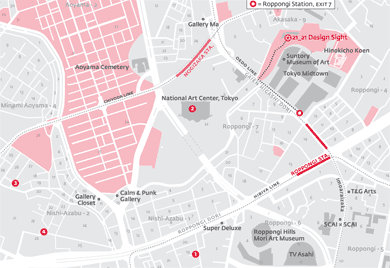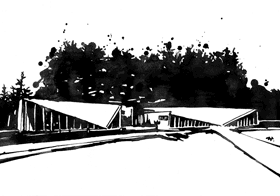21_21 Design Sight
Read online
This entire chapter is online at: read.artspacetokyo.com/spaces/21_21-design-sight
in Roppongi

download a pdf of this map (3.5mb)
access and details
Station: Roppongi
Lines: Hibiya, Oedo
Access: 3 minute walk from exit 4A (Hibiya), or 1 minute walk from exit 7 (Oedo)
Entry: Adults ¥1000, university students ¥800, middle and high school students ¥500, free for elementary school students and younger.
Address: Tokyo Midtown
9-7-6 Akasaka, Minato-ku, Tokyo
Hours: 11am – 8pm
Closed on Tuesdays and from December 30th to January 3rd
Tel: +81-(0)3-3475-2121
URL: http://2121designsight.jp/
In The Neighborhood
As more developments continue to bulldoze their way into Roppongi, the startling mix of old and new becomes increasingly complex. Strolling around the neighborhoods{1} just west of Roppongi Hills will give you a sense of what the area felt like ten years ago. Lose a few hours in the free art library{2} at The National Art Center. A stop at Tahiti{3} will reward you with excellent curry lunch sets that include dessert and coffee. Publishing house Switch runs the well stocked Rainy Day Bookstore & Cafe{4} down a quaint back street in Nishi Azabu. The nearby temple is also a great place to meditate for those shell-shocked by Roppongi’s urban intensity.
About the Space
Exterior

Background Information
Opened in 2007, this sleek, angular Tadao Ando-designed building is now one of Tokyo’s signature works of architecture: two triangular shards of steel-reinforced concrete and glass that rise up out of the ground, conveying lightness and poise.
21_21 Design Sight is one of the more restrained additions to the ongoing redevelopment of Roppongi, a thoughtful contemporary transition between the monolithic shopping utopia of the Tokyo Midtown complex and the low-rise residential areas that surround it. Furthermore, whereas its seamless steel roof and concrete walls could have made for a cold and overbearing interior, its trapezoidal spaces manage to be both futuristic and intimate. Despite seventy percent of the building being located below ground level, a large lightwell lets in natural light. Exhibitions are ambitious, installationlike environments.
Given the international renown of Japanese design, it comes as a surprise that 21_21 Design Sight is Japan’s first design ‘museum.’ However, directed by three of Japan’s most famous designers — Issey Miyake, Taku Satoh and Naoto Fukasawa — its ambitious exhibitions, events and workshops strive to transcend preconceived categories and expectations of what design should be.